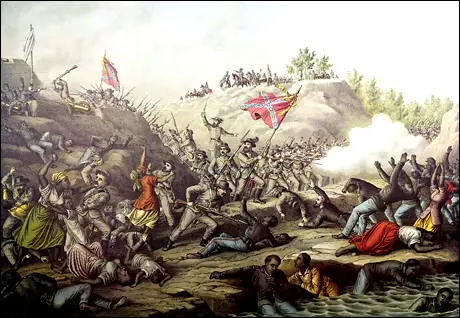Fort Pillow Massacre
In April, 1864, General Nathan Forrest and his men captured Fort Pillow in Jackson, Tennessee. The fort contained 262 African American and 295 white soldiers. It was afterwards claimed that most of these soldiers were killed after they surrendered.

Abraham Lincoln condemned the atrocity but refused to agree to the demands of William Seward (Secretary of State), Salmon Chase (Secretary of the Treasury), Gideon Welles (Secretary of the Navy) and Edwin M. Stanton (Secretary of War), that an equal number of Confederate prisoners should be executed in an act of revenge.
After the war an official investigation discovered evidence that "the Confederates were guilty of atrocities which included murdering most of the garrison after it surrendered, burying Negro soldiers alive, and setting fire to tents containing Federal wounded." However, Nathan Forrest was never prosecuted for the offence and he went on to become the first Imperial Wizard of the Ku Klux Klan.
Primary Sources
(1) Harper's Weekly (30th April, 1864)
On the 12th April, the rebel General Forrest appeared before Fort Pillow, near Columbus, Kentucky, attacking it with considerable vehemence. This was followed up by frequent demands for its surrender, which were refused by Major Booth, who commanded the fort. The fight was then continued up until 3 p.m., when Major Booth was killed, and the rebels, in large numbers, swarmed over the intrenchments. Up to that time comparatively few of our men had been killed; but immediately upon occupying the place the rebels commenced an indiscriminate butchery of the whites and blacks, including the wounded. Both white and black were bayoneted, shot, or sabred; even dead bodies were horribly mutilated, and children of seven and eight years, and several negro women killed in cold blood. Soldiers unable to speak from wounds were shot dead, and their bodies rolled down the banks into the river. The dead and wounded negroes were piled in heaps and burned, and several citizens, who had joined our forces for protection, were killed or wounded. Out of the garrison of six hundred only two hundred remained alive. Three hundred of those massacred were negroes; five were buried alive. Six guns were captured by the rebels, and carried off, including tow 10-pound Parrotts, and two 12-pound howitzers. A large amount of stores was destroyed or carried away.
(2) Harper's Weekly (18th February, 1865)
With a fine tact of simple honesty the President, in his little speech at the opening of the Fair in Baltimore, said exactly what we all wished to hear. The massacre at Fort Pillow had raised the question in every mind, does the United States mean to allow its soldiers to be butchered in cold blood? The President replies, that whoever is good enough to fight for us is good enough to be protected by us: and that in this case, when the facts are substantiated, there shall be retaliation. In what way we can retaliate it is not easy to say.
There is no evidence from Richmond, and there will be none, that Forrest’s murders differ from those of Quantrell. On the other hand, we must not forget that the same papers which brought the President’s speech promising retaliation brought us also the return of the rebel General in Florida, containing, for the relief of friends at home, the names and injuries of our wounded men in his hands, and the list included the colored soldiers of the Fifty-fourth and Fifty-fifth Massachusetts regiments. But if public opinion has justified a stronger policy from the beginning - if the criminally stupid promises of M’Clellan and Halleck to protect slavery and to repel the negroes coming to our lines had never been made, we should not now be confronted with this question, because the rebels would never have dared to massacre our soldiers after surrender. But yet to be deterred from retaliation from fear of still further crimes upon the part of the rebels is simple inhumanity.
Let us either at once release every colored soldier and the officer of their regiments from duty, or make the enemy feel that they are our soldiers. It is very sad that rebel prisoners of war should be shot for the crimes of Forrest. But it is very sad, no less, that soldiers fighting for our flag have been buried alive after surrendering, and it is still sadder that such barbarities should be encouraged by refraining from retaliation. Do we mean to allow Mr. Jefferson Davis, or this man Forrest, or Quantrell, to dictate who shall, and who shall not, fight for the American flag? The massacre at Fort Pillow is a direct challenge to our Government to prove whether it is in earnest or not in emancipating slaves and employing colored troops. There should be no possibility of mistake in the reply. Let the action of the Government be as prompt and terrible as it will be final. Then the battles of this campaign will begin with the clear conviction upon the part of the rebels that we mean what we say; and that the flag will protect to the last, and by every means of war, including retaliation of blood, every soldier who fights for us beneath it.


